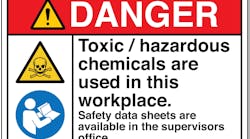On July 29, 2003, the U.S. Senate Environment and Public Works (EPW) Committee approved legislation that would amend the Toxic Substances Control Act (TSCA) to allow the United States to ratify several international treaties intended to control persistent organic pollutants (POPs) and other hazardous substances. This column briefly summarizes the legislation ," S. 1486, "The POPs, LRTAP POPs, and PIC Implementation Act of 2003."The U.S. Environmental Protection Agency (EPA) will probably pass regulations once the law is enacted. Senator Lincoln Chaffee (R- R.I.) introduced the bill on June 29, reportedly after extensive negotiation with EPW Committee members, the Bush Administration, environmental organizations, the chemical industry and other parties. A discussion draft of the regulations would amend TSCA to implement the following three treaties: The Stockholm Convention on Persistent Organic Pollutants (POPs) POPs Protocol to the Convention on Long-Range Transboundary Air Pollutions (LRTAP) In 1979, 34 governments signed the Convention on LRTAP, which represented the first internationally binding instrument to address air pollution on a broad regional basis. Since the LRTAP Convention took force in 1983, it has been extended by eight specific protocols. The Rotterdam Convention on the Prior Informed Consent (PIC) Procedure for Certain Hazardous Chemicals and Pesticides in International Trade The Convention's goal is to establish a first line of defense by giving importing countries the tools and information they need to identify potential hazards. Based on that information, they may choose to exclude chemicals that cannot be safely managed. Once a country has agreed to import a given chemical, the Convention promotes its safe use through labeling standards, technical assistance and other forms of support. Currently, 31 chemicals,"mainly pesticides,"are subject to international PIC procedures under the Rotterdam Convention. A mixed bag of requirements Regulating New POPs Under the discussion draft, EPA could, but would not be required to, regulate newly added chemicals. In addition, individuals could petition EPA to regulate a chemical added to the two POPS treaties, and sue the Agency if it declined to regulate that chemical. The draft sets extensive provisions regarding the addition of new pollutants. However, it also provides affected parties with considerable process once specific provisions are met, i.e.,once a chemical substance or mixture either meets screening criteria identifying it as a POP, requires global action under the POPS convention, or is listed as a POP. Once one of these determinations is made, EPA would be required to publish a notice of proposal in the Federal Register within 45 days. The Agency would also have to provide an opportunity for public comment. Sixty days after publication of the notice, the affected parties would have to provide EPA with key data including the annual quantity of the chemical substance or mixture produced, uses for the chemical, emissions and other relevant data. Based on this information, EPA would then issue a comprehensive report within 240 days after receiving the data. The report, which would first be subject to public comment, would highlight the production and uses of the chemical substance or mixture, the benefits and risks of making and using that chemical, both in the U.S. and globally. This process varies depending on what stage the substance or mixture is in for purposes of listing as a POP. Banned substances Submission of Confidential Business Information (CBI) Care should be taken in reviewing the draft legislation to ensure that opportunities for claims of CBI can be asserted as appropriate. What's next? Although this legislation is still in a preliminary stage, chemical manufacturers and producers should be keenly aware of its potential impact. Industry, the Bush Administration and others support the three treaties. The real questions are what form the legislation should take, and what specific authorizations Congress should provide EPA regarding its discretion to regulate new POP chemicals. Lynn L. Bergeson is a founding shareholder of Bergeson & Campbell, P.C., a Washington, D.C. law firm concentrating on industrial, agricultural, and specialty chemical and medical device product approval and regulation, product defense, and associated business issues.

